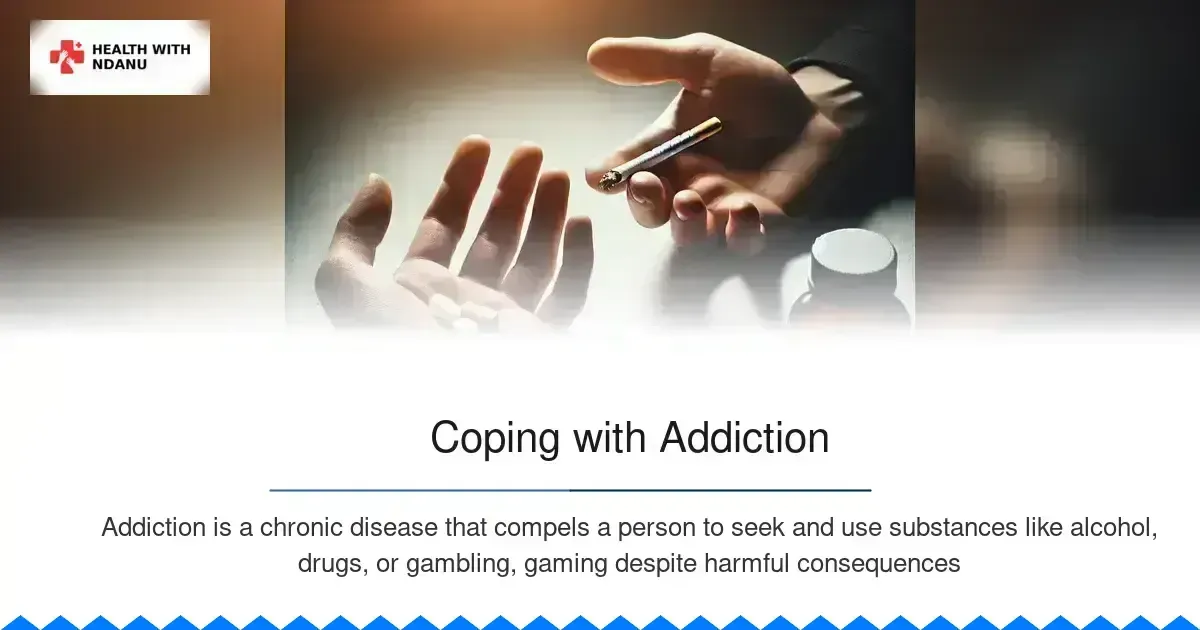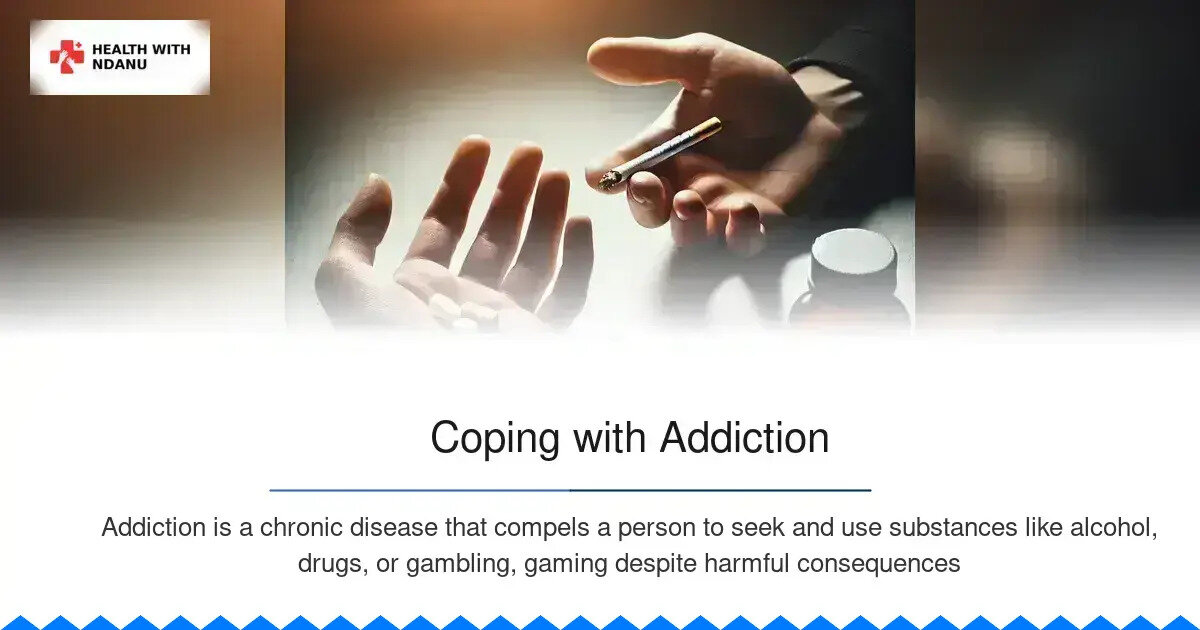No processed graphic yet.


Introduction
Addiction is one of the toughest challenges a person can face. It’s a condition that doesn’t just affect the individual but also their loved ones, relationships, and overall quality of life. But here’s the good news: recovery is possible. No matter how deep the struggle, there’s always hope for change.
In this article, we’ll discuss what addiction is, its effects, and practical ways to cope with it. Whether you’re battling addiction yourself or supporting someone else, this guide is here to help.
What is Addiction?
Addiction is a chronic disease that compels a person to seek and use substances like alcohol, drugs, or engage in behaviors (e.g., gambling, gaming) despite harmful consequences. Addiction affects the brain’s reward system, making it difficult to control cravings or make healthy decisions.
While addiction is complex and multi-faceted, it’s important to know that it’s not a moral failing—it’s a condition that requires understanding, support, and treatment.
Effects of Addiction
Addiction can have profound impacts on physical, emotional, and social well-being. Let’s break it down:
1. Physical Effects
- Increased risk of diseases like liver damage, heart problems, and infections.
- Poor immune system function.
- Changes in brain structure and function.
2. Emotional and Mental Effects
- Anxiety, depression, and mood swings.
- Loss of self-esteem and confidence.
- Difficulty coping with stress or emotions without substances or addictive behaviors.
3. Social Effects
- Strained relationships with family and friends.
- Loss of employment or financial stability.
- Legal troubles in some cases.
Understanding these effects can motivate individuals to seek help and start their recovery journey.
Coping with Addiction: Steps Toward Recovery
Recovering from addiction isn’t a one-size-fits-all process. It takes time, effort, and a personalized approach. Here are actionable steps to help you or someone you love cope with addiction:
1. Acknowledge the Problem
The first step to recovery is recognizing that addiction exists. Denial can be a major barrier, but acknowledging the issue opens the door to change.
2. Seek Professional Help
Addiction often requires professional support. Options include:
- Rehabilitation Centers: Provide structured programs to help individuals detox and recover.
- Therapy and Counseling: Cognitive Behavioral Therapy (CBT) and group counseling can address the root causes of addiction.
- Medication: For some, medication-assisted treatment (MAT) helps manage withdrawal symptoms and cravings.
3. Build a Support System
Recovery is easier with the right people by your side. Surround yourself with friends, family, or support groups who encourage and motivate you.
- Online Communities: Virtual groups provide a safe space to share experiences and seek advice.
4. Identify Triggers
Understanding what triggers addictive behaviors can help you avoid them. Common triggers include:
- Stress and anxiety.
- Certain social settings or environments.
- Negative emotions like anger or loneliness.
Developing healthier ways to cope, like mindfulness or journaling, can make a big difference.
5. Practice Self-Care
Taking care of your body and mind can support recovery. Focus on:
- Exercise: Physical activity releases endorphins, improving mood and reducing cravings.
- Healthy Diet: Proper nutrition strengthens the body and brain.
- Sleep: Aim for 7–8 hours of restful sleep each night.
6. Set Realistic Goals.
Recovery is a journey, not a sprint. Set small, achievable goals and celebrate progress, no matter how minor it may seem.
7. Consider Relapse a Learning Experience
Relapse doesn’t mean failure—it’s part of the process for many. If it happens, reflect on what led to it, and use that knowledge to strengthen your recovery plan.
Supporting a Loved One with Addiction
If someone you care about is struggling with addiction, your support can make a huge difference. Here’s how you can help:
1. Educate Yourself
Learn about addiction to understand what they’re going through. Avoid judgment or blame.
2. Encourage Professional Help
Gently encourage your loved one to seek treatment. Offer to help them find resources or accompany them to appointments.
3. Set Boundaries
It’s okay to set limits to protect your own well-being. Don’t enable harmful behaviors, but show compassion and care.
4. Be Patient
Recovery is a process, and it takes time. Celebrate their progress, and remind them that setbacks don’t erase their efforts.
5. Take Care of Yourself
Supporting someone with addiction can be emotionally draining. Make sure to prioritize your own health and seek support if needed.
Preventing Addiction Relaps
Preventing relapse is a key part of long-term recovery. Here’s how to stay on track:
1. Stick to a Routine
Structure and predictability can help reduce the temptation to return to old habits.
2. Stay Connected
Continue attending therapy sessions or support group meetings. Connection is vital for accountability.
3. Develop Healthy Coping Mechanisms
Replace addictive behaviors with positive ones, like exercising, meditating, or pursuing hobbies.
4. Avoid High-Risk Situations
Stay away from environments or people that might trigger a relapse.
5. Celebrate Milestones
Acknowledge and reward yourself for staying clean and making progress.
Why Recovery is Worth It
The road to recovery may be challenging, but the rewards are worth every effort:
- Regained health and vitality.
- Restored relationships with loved ones.
- Freedom from the cycle of dependency.
- A sense of purpose and control over your life.
You deserve a life free from addiction—a life full of hope, happiness, and possibility.
Final Thoughts
Coping with addiction is not easy, but it’s absolutely possible. Whether you’re starting your recovery journey or supporting someone else, know that every step forward is a victory. The key is to take it one day at a time and never lose hope.
Remember, help is always available. Reach out, stay strong, and believe in your ability to create a better future. You’ve got this!
Do you have tips, experiences, or questions about addiction recovery? Let’s continue this important conversation.
Got Your Own Experience? Share with us
Kategoria Maarufu
Blogu Zinazotembelewa Zaidi
Daily Newsletter
Get all the top stories from Blogs to keep track.



